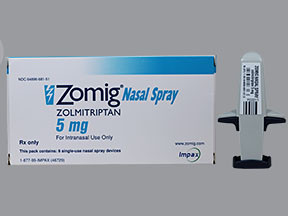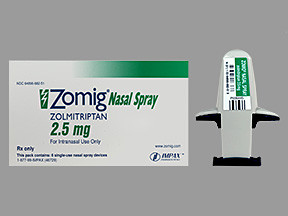ZOLMITRIPTAN SPRAY - NASAL
PHONETIC PRONUNCIATION: (ZOLE-mi-TRIP-tan)
COMMON BRAND NAME(S): Zomig
GENERIC NAME(S): zolmitriptan
Uses
USES: Zolmitriptan is used to treat migraines. It helps to relieve headache, pain, and other migraine symptoms (including nausea, vomiting, sensitivity to light/sound). Prompt treatment helps you return to your normal routine and may decrease your need for other pain medications. Zolmitriptan belongs to a class of drugs known as triptans. It affects a certain natural substance (serotonin) that causes narrowing of blood vessels in the brain. It may also relieve pain by affecting certain nerves in the brain. Zolmitriptan does not prevent future migraines or lessen how often you get migraine attacks.
How to use ZOLMITRIPTAN SPRAY - NASAL
HOW TO USE: Read the Patient Information Leaflet if available from your pharmacist before you start using zolmitriptan spray and each time you get a refill. If you have any questions, ask your doctor or pharmacist. Use this medication at the first sign of a migraine as directed by your doctor, usually 1 spray into one nostril. Avoid spraying into your eyes. Blow your nose gently before using this medication. Remove the protective cap, and block one nostril by pressing firmly on either side of your nose. Place the tip of the spray device into the other nostril and breathe in gently as you press the plunger. Keep your head tilted slightly back, remove the tip from your nose, and breathe gently through your mouth for 5 to 10 seconds. Your nose may feel wet inside and you may notice a slight taste after using the spray. This is normal. If there is no improvement in your symptoms, do not take more doses of this medication before talking to your doctor. If your symptoms are only partly relieved, or if your headache comes back, you may use another dose at least two hours after the first dose. Do not use more than 10 milligrams in a 24-hour period. The dosage is based on your medical condition, response to treatment, and other medications you may be taking. Be sure to tell your doctor about all the products you use, including prescription drugs, nonprescription drugs, and herbal products. If you have a higher risk for heart problems (see Precautions), your doctor may perform a heart exam before you start taking zolmitriptan. He/she may also direct you to take your first dose of this medication in the office/clinic to monitor for serious side effects (such as chest pain). Talk to your doctor for details. If you are using drugs for migraine attacks on 10 or more days each month, the drugs may actually make your headaches worse (medication overuse headache). Do not use medications more often or for longer than directed. Tell your doctor if you need to use this medication more often, or if the medication is not working as well, or if your headaches get worse.
Side Effects
Precautions
Interactions
Overdose
Images
Reviews
Faq for ZOLMITRIPTAN SPRAY - NASAL
Zolmitriptan spray is a nasal spray medication that belongs to a class of drugs known as triptans. It works by narrowing blood vessels in the brain and blocking the release of certain natural substances that cause migraine headaches.
Zolmitriptan spray is used to treat migraine headaches with or without aura (visual disturbances). It is not intended for regular use and should only be taken when a migraine attack occurs.
Zolmitriptan spray should be used as directed by your healthcare provider. It is typically sprayed into one nostril as soon as possible after the onset of a migraine headache. Do not exceed the recommended dosage and avoid using it more than twice in a 24-hour period.
Common side effects of Zolmitriptan spray may include nasal discomfort, unusual taste, dizziness, drowsiness, and nausea. Consult your doctor if these side effects persist or worsen.
No, Zolmitriptan spray is not intended for preventive migraine treatment. It is specifically designed for the acute treatment of migraines once they occur.
It is important to inform your healthcare provider about all the medications you are taking, including over-the-counter drugs and herbal supplements, as they may interact with Zolmitriptan spray. Avoid using other migraine medications within 24 hours of using Zolmitriptan spray, unless directed by your doctor.
It is important to discuss the potential risks and benefits of using Zolmitriptan spray during pregnancy or while breastfeeding with your healthcare provider. They can provide personalized advice based on your specific situation.
Zolmitriptan spray is known to start working within 15 minutes in some individuals. However, the onset of relief may vary from person to person.
Zolmitriptan spray is not approved for use in children under 18 years old. Only use this medication as prescribed by your doctor.
Disclaimer
IMPORTANT: HOW TO USE THIS INFORMATION: This is a summary and does NOT have all possible information about this product. This information does not assure that this product is safe, effective, or appropriate for you. This information is not individual medical advice and does not substitute for the advice of your health care professional. Always ask your health care professional for complete information about this product and your specific health needs.


No Reviews Yet